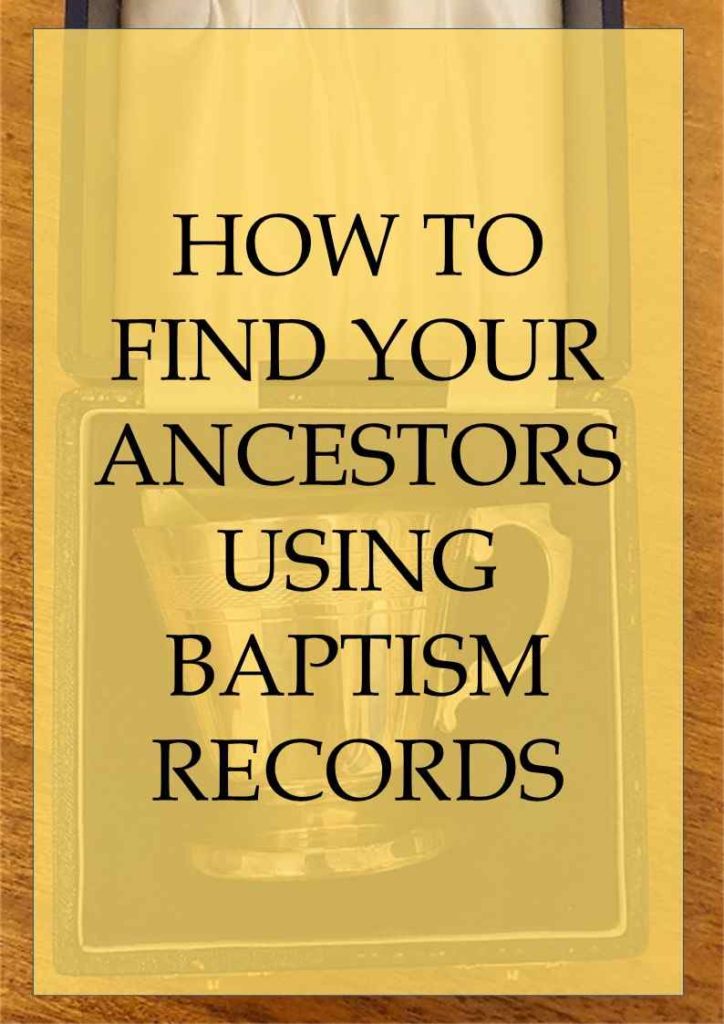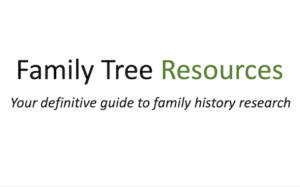
Baptism records were maintained by the church and were records of christenings conducted in the church. A christening was carried out in order to accept the person involved into the family of the church.
It should be remembered that a christening date is not the same as a birth date, and is usually conducted somewhat later, unless there is a specific reason for a baptism to be on the same day as the child’s birth, such as their ill health.
You sometimes see private baptisms in church records, which again could have meant the child was suffering from ill health, and in many cases not expected to survive.
You may also find that some people were baptised as adults, so unfortunately you may never discover the names of their parents.
Baptisms Before 1813
Early entries of baptism records in parish registers contained less information than those from later years when a baptism register book was used.
It is not uncommon for baptism records at the time to simply state the infant’s name, the date and the father’s name. No mother’s name was often entered in a baptism register because the mother was not considered important.
In later registers the mother’s name began to be recorded, and sometimes the child’s birth date. In certain baptism registers from the late 1700’s the mother’s maiden name was included in the entry, which can help you to track down the parent’s marriage.
The information recorded could vary between parishes however. Some vicars stated the infant’s grandfather’s name and you may find more than one child of the same parents were baptised together even though they did not necessarily share a birthday. This was possibly because they could not afford to have each child baptised separately.
If no father is named, it is possible the child was illegitimate, this being shown by the terms base born, illegitimate etc. Sometimes a vicar wrote the word bastard in big letters after the child’s name. This was to signify his displeasure at this circumstance.
Some vicars noted the occupation of the child’s father, and if a particular surname is common in a village, this could help you determine whether you have found the right family.
Baptism Records After 1813
After George Rose’s Act of 1813, the Church was required to keep separate books of baptisms, marriages and burials. This section deals with the baptism register.
The baptism register gave the opportunity to record baptisms in much more detail than the older parish registers, as there were separate columns across the page to enter the child’s name, the parent’s names and the father’s occupation.
The family’s abode was also recorded. In towns and cities, a street name was sometimes entered for the address, but it might not include the house number. In villages only the village name was usually entered.
In some cases, the birthdate was also recorded, and you may find more than one child of the same parents were christened together.
There was also a column where the name of the clergyman who performed the ceremony was recorded.
Information Recorded in the Baptism Register
- When baptised
- Child’s Christian name
- Names of both the mother and father and their surname
- Abode
- Quality, Trade or Profession
- By whom the ceremony was performed
How to Find Baptism Records
Baptism records are normally held in local county Record Offices, but if you are looking for a more recent baptism, the register you are seeking could still be held by the church as it is still in use today, especially if it is a smaller church.
You can also search parish records online. Dustydocs has links to websites that have records of baptisms. It should be borne in mind that this resource is not yet complete as it is compiled mainly by volunteers, but more baptism records are being added all the time.
Some baptism registers have also been made available at FreeReg, which is an online database compiled by volunteers. This index is not yet complete, but more information is constantly being added.
You can also peruse baptism registers online at Ancestry and FindmyPast.
Ancestry
Ancestry is great for anyone who does not have the time to, or is unable to, visit Record Offices or Libraries.
It is especially good if you wish to access records from the comfort of your home.
Read my in-depth review to find out more about its features, advantages, and disadvantages.
FindmyPast
FindmyPast is good for anyone, whether they are just starting their family history journey, or have already conducted some research.
It is especially good for people who wish to read newspaper articles.
Read my in-depth review to find out more about its features, advantages and disadvantages.
International Genealogical Index (IGI)
The IGI, compiled by the Church of Jesus Christ of Latter Day Saints, is a wonderful resource if you are unable to find a record of a baptism.
If I ever have a problem locating an entry in a baptism register, it is one of my first ports of call, and has helped me to track down that elusive ancestor on many occasions.
More and more parish registers are being added to the IGI all the time, so if you are unable to find your ancestor in the index today, try again later. You may find that the entry you are seeking has then been added to the index.
Once you have come to the home page of their website, clicking search and then records will lead you to the main search page where you will find that you can search by name, birth date or place or marriage date or place, and can even add further information if known, such as spouse or parents.
It also includes many Protestant nonconformist records that were deposited in the National Archives in 1837.
The IGI does not only include information from the UK, but all over the world, making it one of the best resources of its type. Having said that, you should still view the original entry in the register because that may contain much more information.
The entry in the IGI only includes the name of the child and the parents, the place of baptism and the date. You may find, for instance, that the entry in the original register contains the maiden name of the mother. This information is not usually included in the entry in the IGI.
I Cannot Find My Ancestor in the Baptism Register
If you are searching in earlier registers, it is prudent to try looking in other places in the register just in case. If the clergyman did not write the entry into the register at the time the event took place, it is possible that he added the entry at a later date.
It may also be worth checking Bishops’ Transcripts, which are copies of the Register that had to be sent to the local Bishop, to see if it was included in this volume.
If a baptism was omitted from the original register, the clergymen may have added it to the Bishops’ Transcript. These transcripts, however, do not include any additional information the clergyman may have included in the original baptism register.
Unfortunately, it may be that the baptism was never recorded in the register, or did not take place at all. If your ancestor was illegitimate, for example, you may find that the shame associated with having an illegitimate child, especially in earlier centuries, made women not want to present their child for baptism.
It is also prudent to try searching for your ancestor in the baptism register of other churches in the area. In Northampton, for example, there are many churches in a relatively small area.
It is also possible that your ancestor may have moved away from the area. During my own research, I have come across a family that moved from Uffculme in Devon to Kentisbeare, a village about 4 miles away, with further children being baptised in that parish.
This is where the additional information the clergyman added to the baptism record was so helpful as I was able to determine that I had the right family because of the father’s occupation.
Another reason you may not be able to find your ancestor in the baptism record is because your ancestors were either nonconformists or Roman Catholics.
Please also view my guides to parish registers in general, marriage records and burial records. You may also find much information is included on memorial inscriptions.
